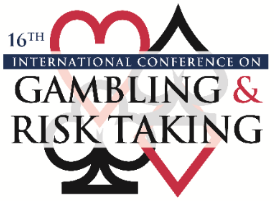Submission Title
Session Title
Session 4-2-D: Online Gambling Behavior
Presentation Type
Event
Location
The Mirage Hotel & Casino, Las Vegas, Nevada
Start Date
10-6-2016 10:30 AM
End Date
10-6-2016 12:00 PM
Disciplines
Economics | Finance and Financial Management | Management Sciences and Quantitative Methods | Statistics and Probability
Abstract
In gambling pools, entrants submit predictions and the prizes are awarded to the prediction or predictions closest to actual outcomes. Some well-known examples are football pools (both the global and American game versions), toto, NCAA March Madness bracket pools and horse racing tournaments. For small pools with complete information about outcome probabilities, exact game theory optimal solutions are straightforward to compute. If there is also complete information about the number and strategy of other players, optimal exploitive strategies are even easier to derive. These problems have been treated in the literature.
This paper argues that the complete information approaches are not good approximations to practical optimal strategies, moreover they are usually computationally infeasible. A robust and computationally simple alternative is introduced.
Keywords
Pools, Toto, Brackets, Tournaments, Prediction
Included in
Economics Commons, Finance and Financial Management Commons, Management Sciences and Quantitative Methods Commons, Statistics and Probability Commons
Optimal Strategy for Gambling Pools
The Mirage Hotel & Casino, Las Vegas, Nevada
In gambling pools, entrants submit predictions and the prizes are awarded to the prediction or predictions closest to actual outcomes. Some well-known examples are football pools (both the global and American game versions), toto, NCAA March Madness bracket pools and horse racing tournaments. For small pools with complete information about outcome probabilities, exact game theory optimal solutions are straightforward to compute. If there is also complete information about the number and strategy of other players, optimal exploitive strategies are even easier to derive. These problems have been treated in the literature.
This paper argues that the complete information approaches are not good approximations to practical optimal strategies, moreover they are usually computationally infeasible. A robust and computationally simple alternative is introduced.

Comments
Attachment: PDF containing 19 slides